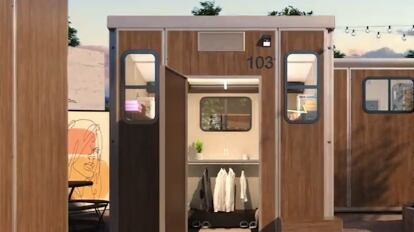Real estate developer Homer Williams wants to build a housing community, at an undisclosed Portland location, consisting of 50 fully insulated 64-square-foot pods.
Williams released a video this evening about his planned project—something his nonprofit has been working on for seven months now, he tells WW.
Williams says he’s still securing funding from both private and public sources. He would not say where in the city he was seeking to open the pod village, nor what materials the pods are made of, other than describing them cryptically as “more advanced materials.”
But he has ambitious plans: He says he wants to open it by June, and he wants to replicate the idea across the city. And his ambitions seem to dovetail with a city zoning change last month that will allow outdoor shelters on most properties in Portland.
Williams, a developer who made his name in the Pearl District and South Waterfront, has emerged as the city’s most consistent private-sector voice calling for alternatives to homeless people sleeping on the street. His nonprofit, Oregon Harbor for Hope, runs shower trucks and a street medicine program. (Williams also serves on the advisory board for the Bybee Lakes Hope Center, a shelter in the never-used Wapato Jail.)
As is his habit, Williams was reluctant to reveal many details about his latest project. He says Oregon Harbor of Hope is “working with other partners, both public and private,” and adds that “we think we’ve come up with the best solution.”
He says a site decision will be made “shortly” about where the 50 pods will be erected, and adds that it’s “an effective way to house a significant number of people.”
The pods in the video resemble tiny houses.
“Our modular housing units are engineered to be secure, safe and remarkably easy to deploy. Featuring beds, storage, heating, electricity for devices, and LED lighting, our unique and highly insulated [units] will be free-standing, waterproof and provide residents opportunity to have a place that is completely their own,” the voice-over on the video says.
The video says the community would provide shareable kitchens, living spaces, bathrooms, laundry rooms and gathering spaces.
“Our managed communities are designed to be fully plumbed for water and sewer, wired for electricity, have regular trash service, and secure access points to make sure everyone is accounted for and cared for,” the video says. ”Residents will be provided a personal ID, address and access to resources designed to provide job placement opportunities and help finding a home of their own.”
